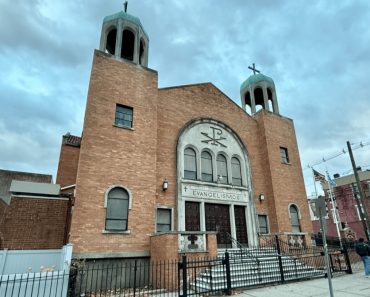There’s a part of me, woven into half of my DNA, that shaped significant pieces of my childhood. This is my Greek side, which always colored my life with exciting traditions and community; but no Hellenic-American events captured my heart quite like Greek festivals.
This weekend I visited the St. Athanasius Greek Orthodox Church in Arlington to attend the Greek Cuisine Fall Festival, where an array of cultural sweet and savory dishes were served in a buffet line, and a stream of thousands of individuals from the city’s Greek community gathered around tables to share meals over the course of the weekend’s festivities.
According to S. Nicholas Kriketos, second vice president of the Parish Council, St. Athanasius has been a pillar of the Arlington and Greater Boston Greek community for 61 years since its founding in 1964. Its annual indoor fall festival has been a staple since the late 1970s, originally hosted by the women’s society of the church, St. Barbara’s “Philoptochos” (from the Greek φιλόπτωχος, meaning “friends of the poor”). The event was originally called a “bazaar,” and focused on crafts and food. When the crafts aspect started to phase out, the festival took on the title of a “kouzina”—the word for “kitchen” in Greek.
The yearly indoor festivals went on hiatus for a few years during the COVID-19 pandemic, making this year’s gathering the first one since 2019. The excitement in the air was palpable as soon as I set foot in the church, greeted by the familiar hum of a gathering filled with passion and a mix of two languages—English and Greek—overlapping with the ring of music from Greece.
Unlike the summer festival, which takes place under a massive outdoor tent and is one of the largest Greek festivals in Middlesex County, the fall festival feels relaxed and warm. Occupying around 5,000 square feet inside the church building, this event gives off a more intimate community feeling compared to the open-air space.
“Standing on one end of the room, you can see everybody,” said Parish Council president Stefanos Bouboulis. “This is more cozy, in one room.”
The menu this year showcased classic Greek dishes: roasted lamb, lamb shank with orzo, roasted chicken, gemista, moussaka, dolmathes, spanakopita, and fasolakia, along with desserts like baklava, galaktoboureko, and kataifi. Everything was prepared by hand by the Philoptochos and church volunteers, with no pre-made aspect of any dish.
I didn’t grow up eating much Greek food outside of holiday family gatherings, but I was still transported back to those times when I bit into the flaky phyllo (φύλλο) of the spanakopita (σπανακοπιτα), a spinach and feta pie. Made with this same phyllo wrapped around a sweet mix of syrup and chopped walnuts, I indulged in one of the most well-known Greek desserts, baklava (μπακλαβάς). My main dish, moussaka (μουσακάς) was foreign to my palate, but I was grateful to try an authentic version of it so close to home.
“It’s all homemade. Everything here is homemade, and the women and the men are both in the kitchen working away,” said Peter Gennis, Parish Council treasurer.
Kriketos emphasized the church’s commitment to the authenticity of the food is central to the church festival’s identity.
“Nothing is pre-bought, which is very very important,” he said. “We’re still one of the select parishes that are able to do that.”
Funds raised from the festival will support the ministries of St. Athanasius, including their upcoming Thanksgiving event, where the church feeds 108 families in Boston, providing all the fixings for families of four.
“We need the money to support our ministries, but the social aspect and the family aspect, with family members working next to each other, it’s great,” said Bouboulis.
When I left, newly re-rooted in the traditions of my childhood and satisfied with homemade moussaka, I found myself eagerly anticipating the summer festival in June.






